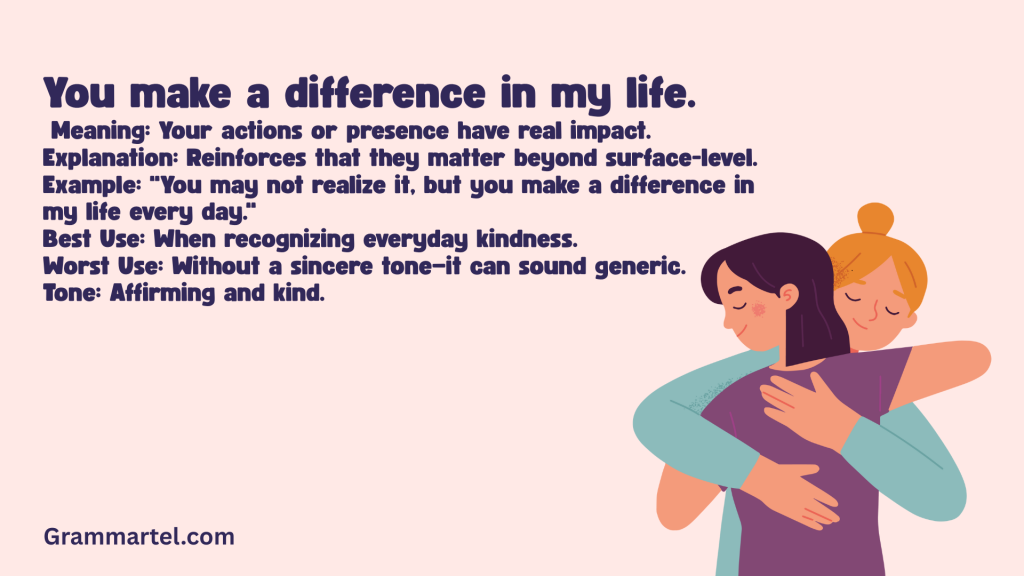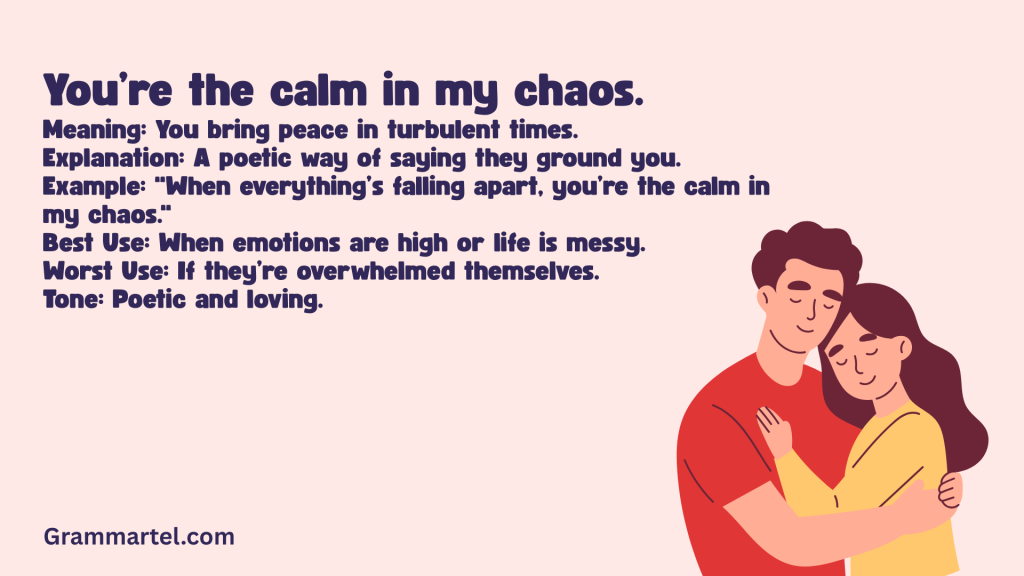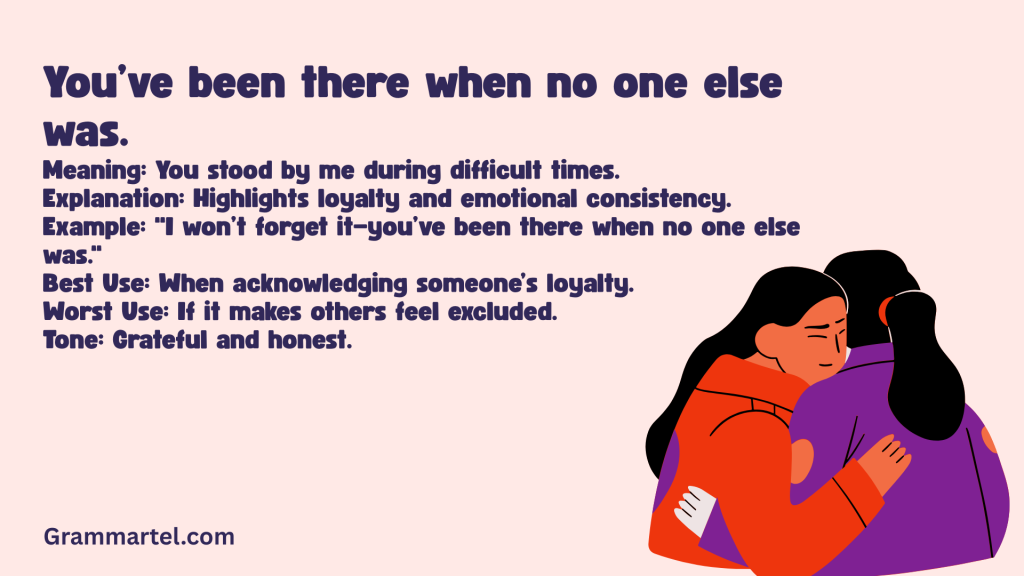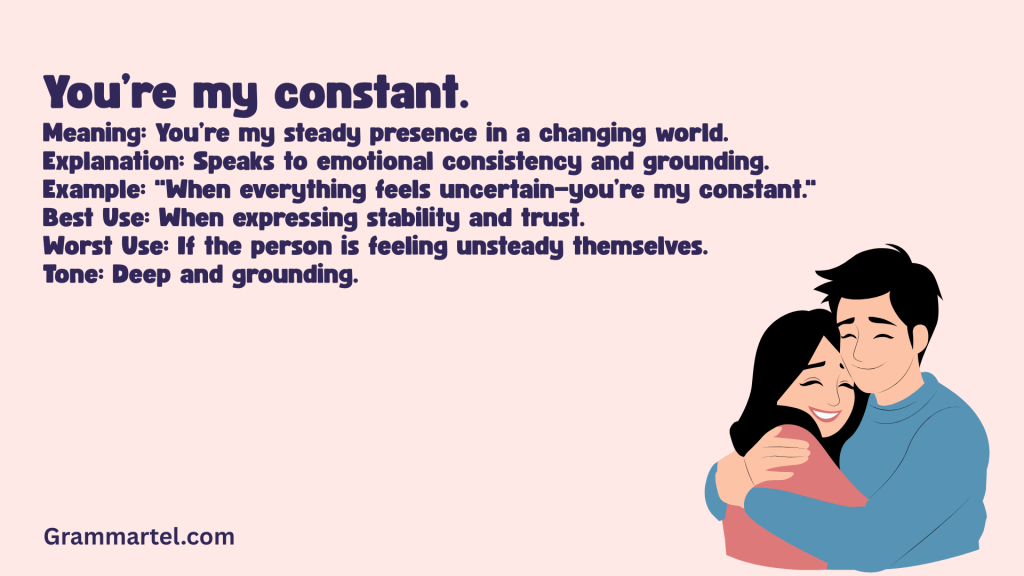Telling someone they matter can make a big difference in their life. Whether it’s a friend, partner, family member, or coworker, we all want to feel seen and valued. Sometimes, finding the right words can be hard, even when the feelings are strong. That’s why we’ve gathered 40 heartfelt ways to say “You are important to me.” These simple, sincere phrases can help you show your love, appreciation, and support in meaningful ways.
What Does “You Are Important to Me” Mean?
When someone says, “You are important to me,” they’re expressing that you hold a special place in their life. This phrase conveys emotional value, personal significance, and often a sense of care, love, or deep appreciation. It’s not just about liking someone—it’s about acknowledging their impact on your life, your thoughts, and your feelings.
The meaning can vary depending on the context and relationship. In a romantic context, it might mean the person deeply cherishes and prioritizes you. In a friendship or family setting, it can express loyalty, support, and emotional connection. Regardless of the relationship, the underlying message is one of affirmation: you matter, and your presence is meaningful.
When to Use “You Are Important to Me”
“You are important to me” is best used in moments of vulnerability, appreciation, or reassurance. Here are some situations where saying this phrase is appropriate and impactful:
- During emotional conversations: When someone is feeling down or insecure, this phrase can offer comfort and validation.
- As a form of appreciation: To show gratitude for someone’s presence or actions, especially when words like “thank you” don’t feel like enough.
- In relationships: Whether romantic, platonic, or familial, it can strengthen bonds and reinforce emotional intimacy.
- To reassure someone: If a person feels distant or unsure of where they stand with you, saying “you are important to me” can provide clarity and reassurance.
- At milestones or goodbyes: During life transitions, such as graduations, farewells, or major achievements, it’s a powerful way to express lasting value and connection.
Use it sincerely and thoughtfully—it’s a phrase that carries emotional weight and should be said with intention.
40 Heartfelt Ways to Say “You are Important to Me” (With Examples)
1. I don’t know what I’d do without you.
Meaning: You’re essential in my life.
Explanation: Expresses emotional dependence and deep connection.
Example: “Honestly, some days I just wouldn’t get through without you. I don’t know what I’d do without you.”
Best Use: During emotional conversations or after someone’s support.
Worst Use: As a casual compliment—it’s too heavy.
Tone: Deeply emotional, vulnerable.
2. You mean the world to me.
Meaning: You’re incredibly significant to my life.
Explanation: Conveys a sense of irreplaceable emotional value.
Example: “No matter what happens, you mean the world to me.”
Best Use: In a romantic or very close friendship context.
Worst Use: In professional or surface-level relationships.
Tone: Intimate and sincere.
3. I appreciate you more than you know.
Meaning: Your value is beyond what I can express.
Explanation: Suggests unspoken gratitude and admiration.
Example: “You’ve done so much for me—I appreciate you more than you know.”
Best Use: After someone goes out of their way for you.
Worst Use: As a vague afterthought—it deserves genuine context.
Tone: Warm and reflective.
4. I’m so lucky to have you in my life.
Meaning: Your presence is a cherished gift.
Explanation: Reflects gratitude and emotional richness.
Example: “Every day I realize I’m so lucky to have you in my life.”
Best Use: As a spontaneous compliment.
Worst Use: If the relationship feels one-sided.
Tone: Grateful and heartfelt.
5. I always feel better after talking to you.
Meaning: Your presence brings comfort and clarity.
Explanation: Emphasizes emotional safety and relief.
Example: “You just have that calming effect—I always feel better after talking to you.”
Best Use: To acknowledge emotional support.
Worst Use: In a joking or sarcastic tone.
Tone: Honest and reassuring.

6. You make a difference in my life.
Meaning: Your actions or presence have real impact.
Explanation: Reinforces that they matter beyond surface-level.
Example: “You may not realize it, but you make a difference in my life every day.”
Best Use: When recognizing everyday kindness.
Worst Use: Without a sincere tone—it can sound generic.
Tone: Affirming and kind.
7. I feel seen when I’m with you.
Meaning: You understand and accept me.
Explanation: Indicates emotional intimacy and trust.
Example: “It’s rare, but I feel seen when I’m with you.”
Best Use: During meaningful emotional exchanges.
Worst Use: In casual acquaintance conversations.
Tone: Deep and vulnerable.
8. You bring out the best in me.
Meaning: You inspire and elevate who I am.
Explanation: Reflects mutual growth and positive influence.
Example: “When I’m around you, I’m just better—more myself. You bring out the best in me.”
Best Use: To show admiration and connection.
Worst Use: If not genuine—it can feel manipulative.
Tone: Inspirational and admiring.
9. You’re one of a kind.
Meaning: You’re irreplaceable and unique.
Explanation: A compliment emphasizing individuality.
Example: “No one else even comes close. You’re one of a kind.”
Best Use: To celebrate someone’s uniqueness.
Worst Use: If overused, it can lose meaning.
Tone: Uplifting and personal.
10. You’ve changed my life.
Meaning: Your impact is life-altering.
Explanation: Strong statement of appreciation or transformation.
Example: “Before you came along, I didn’t even know what I was missing. You’ve changed my life.”
Best Use: When reflecting on personal growth or healing.
Worst Use: Without emotional context—it feels too heavy.
Tone: Powerful and emotional.
11. Just knowing you’re there makes everything easier.
Meaning: Your presence brings emotional security.
Explanation: Highlights how their support provides comfort even from afar.
Example: “It’s been a tough week, but just knowing you’re there makes everything easier.”
Best Use: During stressful or uncertain times.
Worst Use: As a filler—it’s meant to be heartfelt.
Tone: Comforting and appreciative.
12. I trust you with everything.
Meaning: You hold a sacred place in my life.
Explanation: Expresses deep emotional and possibly practical reliance.
Example: “You know me better than most—I trust you with everything.”
Best Use: In long-standing, close relationships.
Worst Use: Too soon in a relationship—it can scare people off.
Tone: Serious and vulnerable.
13. You’re the first person I want to talk to—about anything.
Meaning: You’re my emotional go-to.
Explanation: Suggests priority and trust in communication.
Example: “Good news, bad news—I always want to tell you first. You’re the one I turn to.”
Best Use: In romantic or deep friendships.
Worst Use: If the person doesn’t feel the same—it may pressure them.
Tone: Affectionate and earnest.
14. You’ve helped me become a better version of myself.
Meaning: Your influence has shaped who I am.
Explanation: Acknowledges personal growth through their presence.
Example: “Since we met, I’ve noticed I’ve grown in ways I never imagined—you’ve helped me become a better version of myself.”
Best Use: During milestones or anniversaries.
Worst Use: In short-term relationships.
Tone: Reflective and thankful.

15. You’re the calm in my chaos.
Meaning: You bring peace in turbulent times.
Explanation: A poetic way of saying they ground you.
Example: “When everything’s falling apart, you’re the calm in my chaos.”
Best Use: When emotions are high or life is messy.
Worst Use: If they’re overwhelmed themselves.
Tone: Poetic and loving.
16. I care about you more than words can say.
Meaning: My feelings run deep.
Explanation: Implies a depth of emotion that language struggles to capture.
Example: “I try to explain it, but I just… I care about you more than words can say.”
Best Use: When words feel too small.
Worst Use: When emotional clarity is actually needed.
Tone: Intimate and wistful.
17. You’re my person.
Meaning: You’re my closest emotional bond.
Explanation: Popularized by TV culture, it suggests a ride-or-die connection.
Example: “I don’t care what anyone says—you’re my person.”
Best Use: Among best friends or romantic partners.
Worst Use: With someone who doesn’t understand the phrase.
Tone: Casual but deeply affectionate.
18. Life wouldn’t be the same without you.
Meaning: You’re central to my world.
Explanation: Implies their absence would fundamentally change your life.
Example: “Seriously—life wouldn’t be the same without you.”
Best Use: In deep or long-term relationships.
Worst Use: If the relationship is rocky.
Tone: Honest and heartfelt.
19. I feel at home when I’m with you.
Meaning: You make me feel safe and accepted.
Explanation: Evokes a sense of belonging and warmth.
Example: “We could be anywhere… I feel at home when I’m with you.”
Best Use: Romantic partners or lifelong friends.
Worst Use: In new or formal settings.
Tone: Warm and affectionate.
Similar Reads: 40 Creative Ways to Say “Good Morning” (With Examples)
20. I admire the person you are.
Meaning: You inspire me deeply.
Explanation: Combines respect and emotional closeness.
Example: “Not just for what you do—but for who you are. I really admire you.”
Best Use: When you want to honor someone’s character.
Worst Use: If it sounds overly formal in a casual relationship.
Tone: Respectful and warm.
21. You always show up when it matters.
Meaning: You’re reliable and present when it counts.
Explanation: Acknowledges trustworthiness and consistency.
Example: “No matter what’s going on, you always show up when it matters.”
Best Use: After someone supports you or others consistently.
Worst Use: If used sarcastically or flippantly.
Tone: Appreciative and grounded.
22. You have no idea how much you matter.
Meaning: Your importance is far greater than you realize.
Explanation: Often used to affirm someone struggling with self-worth.
Example: “You’re so humble, but you have no idea how much you matter.”
Best Use: In emotionally supportive moments.
Worst Use: Without follow-up—it may confuse the listener.
Tone: Supportive and sincere.
23. You’re not just a part of my life—you’re a part of me.
Meaning: Our connection is deeply intertwined.
Explanation: Goes beyond friendship to express a shared identity or life path.
Example: “I can’t separate where I end and you begin. You’re part of me.”
Best Use: In romantic or lifelong friendships.
Worst Use: In any relationship without mutual intensity.
Tone: Intense and poetic.
24. I think about you even when we’re apart.
Meaning: You stay in my thoughts constantly.
Explanation: Implies emotional closeness even with distance.
Example: “I’ll be walking or cooking and suddenly I think about you.”
Best Use: Long-distance or emotionally connected relationships.
Worst Use: If it feels clingy or out of place.
Tone: Sweet and tender.

25. You’ve been there when no one else was.
Meaning: You stood by me during difficult times.
Explanation: Highlights loyalty and emotional consistency.
Example: “I won’t forget it—you’ve been there when no one else was.”
Best Use: When acknowledging someone’s loyalty.
Worst Use: If it makes others feel excluded.
Tone: Grateful and honest.
26. You’re the reason I smile more.
Meaning: You bring joy and light to my life.
Explanation: Highlights someone’s uplifting influence.
Example: “Ever notice how I laugh more now? You’re the reason I smile more.”
Best Use: During light-hearted or romantic moments.
Worst Use: If said too early—it may seem over-the-top.
Tone: Joyful and affectionate.
27. I’m better just for knowing you.
Meaning: You’ve helped shape who I am in a positive way.
Explanation: Reflects how their presence has enriched your life.
Example: “I honestly believe I’m better just for knowing you.”
Best Use: When giving heartfelt thanks or reflecting.
Worst Use: As a generic compliment.
Tone: Thoughtful and mature.
28. I always feel safe with you.
Meaning: You create emotional or physical safety.
Explanation: Affirms trust and vulnerability.
Example: “With you, I can let my guard down. I always feel safe.”
Best Use: During vulnerable moments.
Worst Use: In situations where safety is being questioned.
Tone: Intimate and sincere.
29. You matter more than you know.
Meaning: Your value is deeper than you realize.
Explanation: Encourages someone who may not recognize their worth.
Example: “Even when you feel invisible—you matter more than you know.”
Best Use: Supporting someone during a low point.
Worst Use: Without emotional backing.
Tone: Supportive and grounding.
30. You’re not replaceable—don’t ever think you are.
Meaning: You’re uniquely irreplaceable.
Explanation: Emphasizes that no one could take their place.
Example: “People come and go, but you? You’re not replaceable.”
Best Use: When someone feels undervalued.
Worst Use: If the relationship is unstable or ending.
Tone: Reassuring and bold.
31. You make life better just by being you.
Meaning: Your existence alone brings joy.
Explanation: Compliments their essence, not just actions.
Example: “You don’t have to try. You make life better just by being you.”
Best Use: To lift someone’s spirits.
Worst Use: In overly formal settings—it’s too personal.
Tone: Gentle and kind.

32. You’re my constant.
Meaning: You’re my steady presence in a changing world.
Explanation: Speaks to emotional consistency and grounding.
Example: “When everything feels uncertain—you’re my constant.”
Best Use: When expressing stability and trust.
Worst Use: If the person is feeling unsteady themselves.
Tone: Deep and grounding.
33. I see you. Really, I do.
Meaning: I understand you beyond the surface.
Explanation: A powerful way to acknowledge someone’s essence.
Example: “You think no one notices—but I see you. Really, I do.”
Best Use: When someone feels overlooked.
Worst Use: If said without meaning—it can sound patronizing.
Tone: Intimate and affirming.
34. I’m here for you—always.
Meaning: You can count on me no matter what.
Explanation: Offers emotional security and support.
Example: “Whatever happens, just know—I’m here for you. Always.”
Best Use: During difficult or emotional conversations.
Worst Use: If you can’t follow through.
Tone: Steady and loyal.
35. You matter to me more than you think.
Meaning: You’re more significant than you may realize.
Explanation: A gentle reminder of their importance.
Example: “Don’t underestimate it—you matter to me more than you think.”
Best Use: In emotionally supportive settings.
Worst Use: When someone’s seeking clarity, not comfort.
Tone: Reassuring and heartfelt.
New to See: 40 Better Ways to Say “Quick Learner” (With Examples)
36. Being around you feels right.
Meaning: Your presence feels natural and safe.
Explanation: A feeling-based expression of emotional alignment.
Example: “I don’t have to try around you. Being around you just feels right.”
Best Use: Early stages of connection or bonding.
Worst Use: If one person isn’t feeling the same.
Tone: Honest and warm.
37. You’re my favorite person.
Meaning: You hold a special, unmatched place in my heart.
Explanation: A sweet and playful declaration of emotional preference.
Example: “Out of everyone? You’re my favorite person.”
Best Use: In close relationships or with kids.
Worst Use: In group settings where it may cause jealousy.
Tone: Light and loving.

38. I respect you so much.
Meaning: You have my admiration and trust.
Explanation: Grounded in integrity, this says they’ve earned your regard.
Example: “Not just for what you do, but how you do it—I respect you so much.”
Best Use: To affirm someone’s actions or character.
Worst Use: If said casually or without context.
Tone: Professional or heartfelt.
39. I feel lucky just knowing you.
Meaning: Your presence in my life is a gift.
Explanation: Simple gratitude for their existence in your circle.
Example: “Really—just knowing you feels like a little piece of luck.”
Best Use: To celebrate connection.
Worst Use: If it comes off as flattery.
Tone: Cheerful and sincere.
40. You’ve become family to me.
Meaning: You’re more than a friend—you’re chosen family.
Explanation: Suggests deep loyalty and love.
Example: “You’ve stuck with me through it all. You’ve become family to me.”
Best Use: In friendships or non-biological bonds that feel permanent.
Worst Use: Too soon in a friendship.
Tone: Heartfelt and rooted.
Conclusion
Everyone needs to feel important, especially to the people they care about. A kind word or thoughtful message can brighten someone’s day and strengthen your bond. Use these phrases to remind the people you love just how much they mean to you. It doesn’t take much—just a little honesty and heart. Small moments of kindness often leave the biggest impact. So go ahead and speak from your heart.
Better writing, made faster—with Grammartel.

